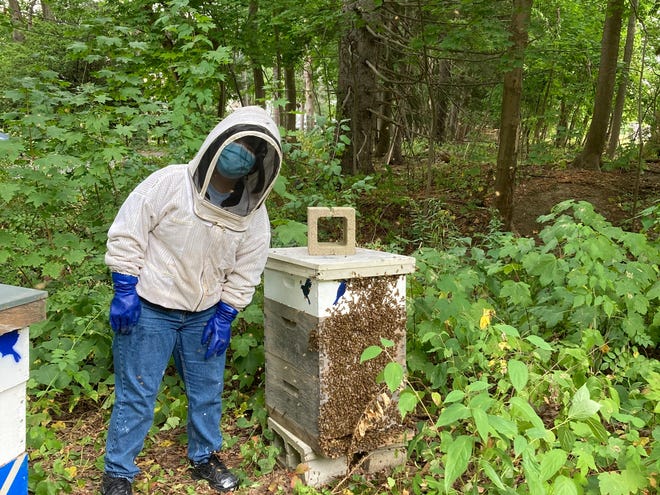Pollinator power: Lexington recognized for bee conservation
February 2nd, 2021 by Ross Cristantiello
When Sophie Gregoretti joined the Lexington High School Bee Club as a freshman, she didn’t know what to expect. Knowing nothing about beekeeping, Gregoretti was simply looking for a way to get involved with an environmental cause.
"I knew I cared a lot about the environment but I never knew what to do about it. I wanted something tangible. Getting my hands dirty is exactly what I was looking for," she said.
She was afraid of getting stung at first, but within five minutes of putting on the beekeeping suit Gregoretti realized that there was no reason to be concerned. That year, Gregoretti’s friend Waka Okuda also joined up, knowing little about the specifics of beekeeping or its importance. Four years later, the two are LHS seniors and co-presidents of the club, working diligently with Master Beekeeper Alix Bartsch to preserve a crucial yet and often-overlooked aspect of the local ecosystem.
"To this day I haven't been stung, even in a cloud of buzzing bees. It's kind of comforting once you get used to it." Okuda said.

Now, the club and Bartsch’s Lexington Bee Company have teamed up to earn Lexington the distinction of becoming an official “Bee City,” the first in the state and only the second in New England. The Bee City program is an initiative from the Xerces Society for Invertebrate Conservation that encourages communities to publicly commit to becoming a pollinator-friendly area. Official Bee Cities must encourage plant growth for pollinators and pledge to use pest management that will not harm these insects.
To achieve this, Bartsch and the students worked with town government and other local conservation groups to form a proposal to the Select Board, which was approved in October.
Bartsch, who is one of three Master Beekeepers in the state recognized by the Eastern Apiculture Society learned about the program and brought it to the Bee Club. They found that many of the things necessary for approval as a Bee City were already being done in town.
"I grew up in Lexington, I've lived here since 1968 and have kept bees here since the 70s. I could tell that we were already doing all kinds of things that are helpful to pollinators," Bartsch said.
She has dedicated her professional career to preserving bees and other pollinators, such as butterflies and other insects. Bartsch now oversees 50 colonies of bees in Lexington and surrounding areas. Each hive contains around 40,000 insects, she said.
But why are bees so important?
They are the backbone of the ecosystem, Bartsch said. Pollinators help grow plants at the bottom of the food chain, which in turn feed birds and smaller animals. Larger animals then feed on these, and the ripple effect continues. When conservationists increase the resources at the bottom of the chain, the entire ladder benefits. After installing a hive at the Lexington Interfaith Garden, for example, Bartsch said that the amount of produce nearly doubled.
Bartsch had teamed up with her daughter, Anastasia, to run the Lexington Bee Company. They offer a variety of products, and will even help install and care for hives on private and public property. About five years ago, Anastasia decided to share the family knowledge with her peers at school, and created the LHS Bee Club. While she is now in college, her mother continues to work with students like Okuda and Gregoretti to keep conservation and education efforts alive.
The idea of a beekeeping club at school is unique, and not something Bartsch had heard of before, she said. While they were unsure of how much interest it would draw initially, the club drew over 100 people to its area the first time it was at an LHS activity fair, she added.
Before the pandemic, the club would meet weekly for workshops with Alix or community service opportunities taking care of the colonies. There is also plenty of work to be done away from the actual bees, like constructing the hives or honey-based products like candles, Bartsch said.
In recent years, the threat to honey bees has become severe. The top threat to them is the Varroa mite, Bartsch said. This parasite can only reproduce in bee colonies, feeding off the insects and carrying disease. Varroa mites likely originated in Asia, but have since been introduced to bee colonies around the world, to disastrous affect.
Loss of habitat is also a serious issue. There are fewer wildflowers today, Bartsch said, which limits where a bee colony can thrive. Another factor is an increased pesticide use, she said. In particular, broad-leaf weed killers can destroy pollinators.
"It's harder than ever to keep a bee alive than it ever was in the 50 years I've been doing this. It's more expensive and more challenging. But people are also more aware of how critical bees are,” Bartsch said.
The question Bartsch said she gets most often is how the average person can help pollinators survive and thrive, she said. Aside from hosting a colony on your property, Bartsch recommends simply planting flowers anywhere you can. Sunflowers are particularly nutritious for bees and other pollinators. The Lexington Bee Company plans to sell easy-to-grow sunflower kits for those interested.
"It really enhances our ecosystem Bees are amazing, they're a fascinating superorganism that's both helpful to mankind and the environment,” Bartsch said. “That's why I'm so passionate about this."
